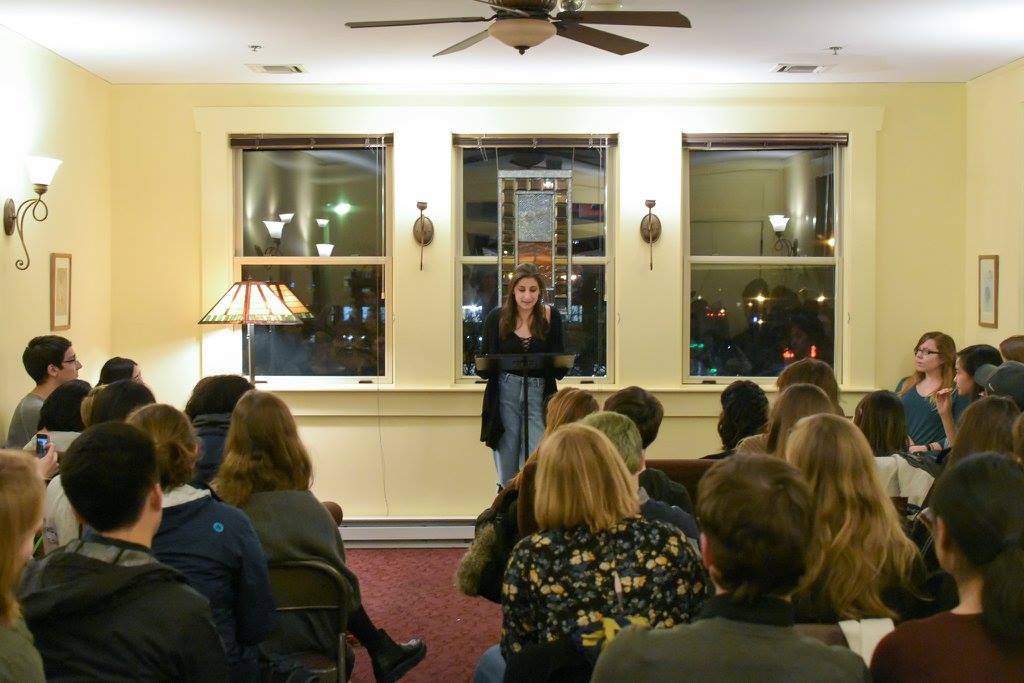Last Friday, my friend Karen invited me to an open mic night for anyone who wanted to share their writing—poetry, fiction, creative nonfiction, or even songs. Karen’s the editor-in-chief of Xylem, an independent, student-run literary magazine on campus, so some of the staff shared their work, but most of the readers were just people in the audience who decided to share.
Almost every reading I’ve been invited to I’ve gone to, but it’s a weird thing, because I don’t really love them. Okay, to be specific, I don’t love listening to people read. I’m not always the best auditory learner—my mind drifts, and I end up thinking about whatever’s going on in my life, in the same way your mind wanders during a particularly boring lecture. It makes it harder that I’m not super good at understanding poetry; sometimes I can work out the meaning (either the dramatic narrative or the emotional symbolism) if I sit down and concentrate hard and reread the poem a few times, but it’s almost impossible for me to figure it out when it’s being read aloud.
Even if I could carefully pay attention to every single person reading, I’m very bad at telling when poetry is actually good. Every student reading I go to, I hear poems that I sense are pretty good, since there are some decent images and cool words being used, but I have no idea what they actually mean. I know the point of poetry isn’t to figure out what it all ‘means,’ per se, but it still can be frustrating when you feel like you’re not getting much out of a poem aside from the sense that it sounds kind of interesting.
There were some stories and poems I really liked on Friday, when I was able to fully engage. One girl shared a ‘letter to all the guys she kissed,’ which involved a lot of wordplay with numbers. It was pretty hilarious, and well-read, and everyone was laughing with every line she read. One guy sheepishly read a short piece about the couch he owns, with all its mysterious and questionable stains—also very funny.
I thought a lot that night about why I continue to go to events like these when I’m only fitfully entertained and engaged in the reading itself. Well, for one, I go for my friends, like Karen. I want to support them, to hear them read their writing or see what they’ve dedicated their time to outside of class.
But I go mostly for the community. When I sat there in that room—the cozy back room on the second floor of Crazy Wisdom Bookstore and Tearoom—I felt, momentarily, at peace. It came at the end of a long week dealing with the results of Tuesday’s presidential election, and for a moment I wanted to just stop talking and thinking about it all and just sit and be with people who I felt understood me—even if I didn’t actually know most of them. One essay mentioned the election, but most of the pieces were about other things. When you’re dealing with what we all dealt with this week, poems about regular old teenage heartbreak are downright comfort food.
Even when an open mic night doesn’t come in the middle of a politically cataclysmic week, though, it provides comfort. There’s something about looking around and seeing English majors you vaguely know—that girl who talked a little too much in my Shakespeare class, that girl whose writing I was always jealous of in my creative writing class, those five people I recognize from The Michigan Daily. Even the people you don’t recognize can make you feel at home; some of the students sharing their work were STEM majors, and there was something endearing about seeing them timidly prefacing their reading: “I’ve never done this before,” or “I haven’t really looked this over yet,” or “Sorry, I’m kind of nervous.”
I looked out the window while one guy read, noticing the lights of the Ann Arbor News building across the street, the cars flitting by on the street below. I wondered if I’d have a similar, but larger-scale view a year from now, maybe living in New York and going to a reading like this one, with more people I didn’t know but who felt like my people. I wondered if I’d go to any Trump-related protests in Manhattan, if I’d have a group of liberal, revolutionary-type friends like me who wrote poetry and drank tea in cable knit sweaters and clapped and cheered for one another, even when the poems weren’t that good.
Maybe it was too romantic of an idea. Maybe we could all use a little romance right now.
Check out Xylem Literary Magazine here. The above photo was taken from Xylem’s Facebook page.










